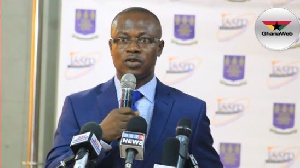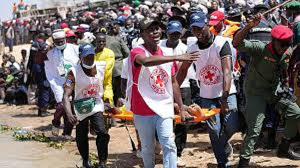Parliament was on Monday recalled for an emergency meeting, but the treatment of the Vigilantism and Related Offences Bill, 2019, might not feature in its proceedings during the five-day sitting from Monday, April 29 to Friday, Amy 3, 2019.
The House was informed at its adjournment on Friday, April 12, 2019 of a possible recall from recess to consider among other issues, the Vigilantism and Related Offences Bill, 2019.
However, Majority Leader and MP for Suame Constituency Osei-Kyei-Mensah Bonsu, told the House, at the opening of the emergency meeting, in Accra, that “indications from the Committee on Constitutional, Legal and Parliamentary Affairs reveals that further consultation is required.”
He said that included the Professor Emmanuel Asante Committee Report on its meeting with political parties, and “in the circumstances, the consideration of the Bill at this Emergency Meeting may not be done.”
Mr Kyei-Mensah-Bonsu added that the House would however concentrate on the Companies Bill, 2018, the Sinohydro related tax exemptions legislations, which ought to be worked on with urgency by the close of the month of April, because of their high economic benefits to the nation.
On behalf of the Business Committee, the Majority Leader commended the legislators for their positive response to the recall of the House. “It is hoped that Members would lend their support to the transaction of the urgent business scheduled for action by Parliament,” the Leader said.
Minority Leader and MP for Tamale South Haruna Iddrisu, in response queried why the Vigilantism Law, would not feature on the proceeding, as members had been told of possible recall specifically for its consideration.
He indicated that the House was ready to do Government Business, but cautioned that the Legislators would also have to play their representation roles, by being in their constituencies and with their constituents.
This, he said was a determinant to the survival of the legislator in Parliament, and cautioned that the Legislature should not be treated as an extension of the Executive.
In reply, the Majority Leader said the business that was to be transacted by the House was Public Business, and urged for political parties to work out schemes to make MPs on their parties survive. Insisting that Government Business must still be done.
Earlier in a welcoming statement, Speaker Professor Aaron Michael Oquaye appealed to the Executive to co-operate with the Leadership of House, by ensuring dispatch in the delivery of information to the House and its Committees.
Apparently, referring to Ministers who appear in the House on behalf of the President, the Speaker said: “Their presence to the House should not be a matter of explanation but actualised indeed.”
The Speaker assured the House of ensuring adequate provision of resources for the smooth discharge of work; and called for maximum cooperation from the Leadership, and members of the House, and to creditably discharge their obligations.
He also appealed to the Clerk of the House to be proactive as always to ensure that the administrative machinery was well set for good result delivery.
General News of Tuesday, 30 April 2019
Source: ghananewsagency.org













